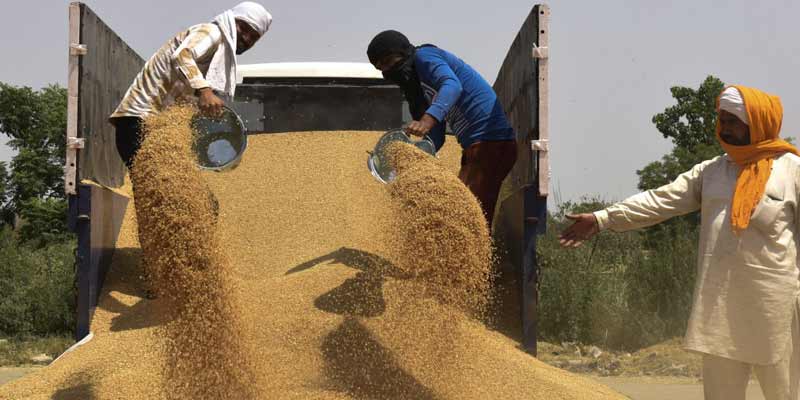- India
- Jul 05
- Kevin Savio Antony
FCI procures 266 lakh MT of wheat in Rabi season
• The Food Corporation of India (FCI) has procured 266 lakh metric tonnes (LMT) of wheat during the current Rabi Marketing Season (RMS) 2024-25.
• Last year, FCI procured 262 LMT of wheat during the same season.
• The Ministry of Consumer Affairs, Food & Public Distribution stated that more than 22 lakh Indian farmers have benefited from the purchase of wheat during Rabi Marketing Season 2024-25.
Key points:
• About Rs 61 lakh crore has been directly credited to the bank accounts of these farmers immediately upon the purchase of wheat at the Minimum Support Price (MSP).
• Production: The provisional figures indicate that the total wheat procurement during RMS 2024-25 stands at 266 LMT, exceeding the RMS 2023-24 figure of 262 LMT and the 188 LMT recorded during RMS 2022-2023.
• Among the major wheat-producing states, Uttar Pradesh and Rajasthan have shown significant improvements in their wheat procurement quantities.
• Uttar Pradesh has recorded a procurement of 9.31 LMT compared to 2.20 LMT last year, while Rajasthan has achieved 12.06 LMT, up from 4.38 LMT in the previous season.
• The government normally commences the procurement of wheat under RMS on the 1st of April every year; however, for the convenience of farmers, it was postponed by about a fortnight this year in most of the procuring states.
What is MSP?
• The Minimum Support Price (MSP) for wheat this year was declared at Rs 2,275 per quintal.
• The MSP is the minimum price for select crops raised in the kharif and rabi seasons that the union government considers remunerative for farmers and hence deserving of support.
• It acts as a safety net, ensuring that farmers receive a fair price.
• In addition to wheat, during the Kharif Marketing Season 2023-24, paddy procurement for the central pool exceeded 775 LMT, benefiting more than one crore farmers through the disbursement of more than Rs. 1.74 lakh crore to the bank accounts of these farmers towards the purchase of their paddy at MSP.
Food Corporation of India (FCI)
• The Food Corporation of India was set up under the Food Corporations Act, 1964 by the Parliament.
Objectives of food policy:
• Effective price support operations for safeguarding the interests of the farmers.
• Distribution of foodgrains throughout the country for public distribution system.
• Maintaining a satisfactory level of operational and buffer stocks of foodgrains to ensure National Food Security Since its inception, FCI has played a significant role in India’s success in transforming the crisis management-oriented food security into a stable security system.
Nodal Ministry: Ministry of Consumer Affairs, Food and Public Distribution.
(The author is a trainer for Civil Services aspirants.)

